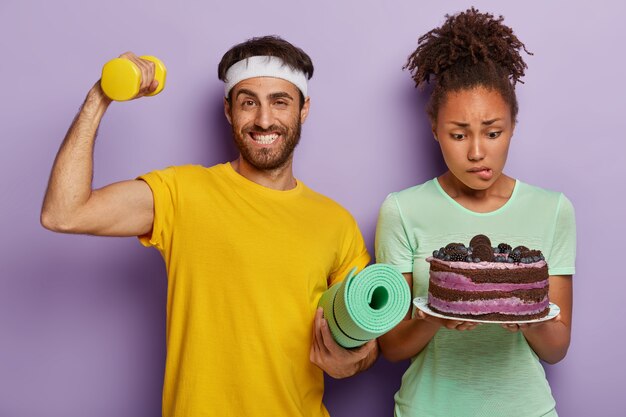Proper nutrition for young athletes
Eating much more than consuming carbohydrates or sports drinks is beneficial for increasing strength and athletic performance. If the athlete has a balanced and proper diet, most likely you will not need to take supplements and you will provide all the needs of your body well. young athletes eating better
The nutritional needs of adolescent athletes are very high and should provide the energy and nutrients needed by adolescent athletes well. Because athletes are more active than their peers, adolescents who exercise regularly need more calories to meet both their energy needs for exercise and growth. Depending on their level of activity, adolescent athletes may require between 2,000 and 5,000 calories per day. In some cases, their daily calorie requirement may reach 7000 calories.
If we do not eat enough and do not provide nutrients to our body, the body will not reach the peak of performance and even the muscles of the body may break down to produce energy due to insufficient energy supply. Of course, this rarely happens because muscles are the last resort for breaking down and producing energy. But you should know that when the athlete does not get the calories he needs from his diet, the process of building muscle will stop and in extreme cases it will lead to muscle burning.
Weight loss diet for teenage athletes
Since young athletes need a lot of calories, dieting is very sensitive for their weight loss (note that here we mean the weight loss of people who have a suitable weight and percentage of fat mass, but due to the requirements of the field They need to reduce their BMI (for example, the ideal BMI for professional gymnasts is approximately 18, while this BMI is dangerous for ordinary people). In sports that emphasize weight, such as wrestling, swimming, dancing or gymnastics, excessive weight loss is associated with negative side effects, which supplements are used to reduce the effects.
Losing weight is safe for athletes who are overweight and have a high fat mass, but to maintain athletic ability, it is better if the athlete’s weight loss program coincides with periods of less activity.
To control fat mass, the best thing to do is to have a proper diet plan, eat snacks on time and regulate sleep hours. On the other hand, for children and teenagers whose growth plates have not closed, it can also increase height.
Avoiding foods that have a high glycemic index (increases blood sugar quickly) reduces insulin secretion. Insulin secretion is accompanied by fat and glycogen storage. So, consumption of sweet foods, regardless of the amount of calories they contain, can activate fat formation.
If you are pressured by your coach or teammates to lose weight, talk to your nutritionist first. Consulting a nutritionist specializing in adolescent sports can help you follow the principles of weight loss and prevent complications, while maintaining your performance and ability in sports as much as possible.
In order to have a suitable weight loss diet for young athletes, you must follow the following points in the diet plan:
Consuming a variety of foods in the diet
High consumption of carbohydrates such as pasta and pasta is a good trick to provide energy in competitions, but we must also value the principle of diversity in the diet, you must eat a variety of foods to get a wide range of micronutrients and macronutrients. What does stabilizing weight after obesity mean
Carbohydrates are the body’s primary fuel, but they are only one nutrient an athlete needs. Vitamins, minerals, protein and fats should be in the right amount in the diet for the body to perform at its best. Therefore, be sure to include these items in your diet and consume them.
Provide minerals needed for muscle function and essential vitamins
Athletes need strong bones and should consume more calcium, calcium helps build their bones; Iron also brings the required oxygen to the muscles and its sufficient presence in the athlete’s diet is essential. Most teenagers, especially those who are very active, are deficient in these two important minerals because their needs may be higher than other teenagers.
To provide the iron needed by the body, you can eat lean meat, fish and chicken. Green leafy vegetables and iron-enriched cereals are also good sources of iron. Calcium is essential to protect against fractures caused by multiple impacts and heavy activities. Calcium is found in legumes, especially peas, and dairy products, such as low-fat milk, yogurt, and cheese.
In addition to calcium and iron, other vitamins and minerals are needed to maintain the function of the immune system and improve the athlete’s abilities. Maintaining a balanced diet, including various fruits and vegetables, vitamins and minerals needed for health. and provides sports performance.
Appropriate consumption of protein in the athlete’s diet
Athletes may need more protein than normal people, but most of the time, the protein they need is obtained through a proper diet. There are misconceptions that athletes need protein supplements to increase muscle mass. Muscle growth is achieved by having a proper diet along with regular exercise and hard work. Getting too much protein can harm the body. Complications such as dehydration, calcium excretion and even kidney problems. In addition, the body does not store the extra protein received and only increases the economic burden and will not have any benefits for the body. Fish, lean meat, chicken, eggs, dairy, nuts and legumes, soy and peanut butter are good sources of protein.
carbohydrate
Carbohydrates are the main source of energy for young athletes. In the article related to the effect of keto and low-carb diets on the performance of athletes, we stated that reducing the consumption of carbohydrates or following a low-carb diet is not a good idea for athletes because, apart from the unpleasant side effects they have, it makes the athlete feel tired and exhausted. and finally have a negative effect on sports performance.
Carbohydrate sources include fruits, vegetables and grains. Whole grains (such as brown rice, oatmeal, whole wheat bread) are more suitable for providing the body with carbohydrates because, in addition to providing the energy needed by athletes, whole grains also contain fiber. and provide other nutrients needed for a person’s health.
Simple carbohydrates such as chocolates or soft drinks have less nutritional value because they do not contain any of the other nutrients the body needs. In addition, eating sweet snacks before training or competition causes a quick and sudden release of energy, and with the release of insulin, a person’s blood sugar drops suddenly and loses energy.
Fats
Everyone needs a certain amount of fat every day, and this is especially true for athletes, because the carbohydrate stores in the muscles are used up quickly, and muscles need fats for long-term activity. Fats, like carbohydrates, have different types. Nutritionists advise athletes to include healthy fats, including unsaturated fats, in their diet. Unsaturated fats are found in most vegetable oils, some fish, nuts and seeds. Try to minimize trans fats (such as hydrogenated solid oils) and saturated fats (found in meat and full-fat dairy).
Choosing the time to serve high-fat meals is also important for athletes. Fatty foods can slow down digestion and it is better to avoid eating these foods a few hours before and after exercise.
Various complications caused by arbitrary consumption of supplements in teenagers
Protein and energy pills are not very useful for the athlete, but they are not very harmful either. Energy drinks have a lot of caffeine, so you shouldn’t drink them before exercise. But in the case of other supplements, it should be said that they leave many side effects.
Anabolic steroids can interfere with a person’s sex hormones and cause side effects such as shrinking of the scrotum, baldness in boys and facial hair growth in girls. Steroids can cause mental problems, including depression and extreme mood swings.
Some supplements contain hormones that are related to testosterone (such as dehydroepiandrosterone or DHEA for short). These supplements can have side effects similar to anabolic steroids. Other sports supplements (for example, creatine) have not been tested in people under 18 years of age, so the risks of using them are not yet known.
Salt tablets are another supplement that may have dangerous side effects for teenage athletes. People take them to prevent dehydration, but salt tablets can actually lead to dehydration. Salt in large amounts can cause nausea, vomiting, muscle cramps and diarrhea and may damage the stomach lining. In general, it is better to drink enough fluids instead of taking supplements that retain water in the body. You can replace the electrolytes you lose while sweating with sports drinks during exercise. Also, the meal consumed after exercise can compensate for lost electrolytes.
Hydration in adolescent athletes
We talked about the importance of water supply in shooting sports and other sports; Water is as important as food to maintain performance in the game. When you sweat and lose body water during exercise, especially in hot and humid weather, your body temperature rises due to activity and you feel headache and fatigue. Even mild dehydration can affect an athlete’s physical and mental performance. The amount of fluids needed by each person depends on age, size, level of physical activity and ambient temperature.
Nutrition experts recommend that athletes drink fluids before and after exercise, as well as every 15 to 20 minutes during exercise. Don’t wait until you feel thirsty, because thirst is a sign that your body needs water for a while! But you did not fall from the other side of the roof! Do not force yourself to drink more fluids than you need. When you drink a lot of water, it expands in your stomach and it becomes difficult to run and do sports activities.
If you like the taste of sports drinks better than water, there is nothing wrong with drinking them. But be careful that sports drinks, because they have calories unlike water, can be more useful than water in situations where you exercise for more than 60 to 90 minutes or sweat a lot.
Avoid drinking carbonated drinks or fruit juice as they can cause stomach ache during competition. Never drink energy drinks before exercise. Energy drinks contain a lot of caffeine and other substances that cause heart palpitations in athletes.
Effect of caffeine on adolescent athletes
Caffeine is a diuretic and causes dehydration if the excreted water is not replaced. Nutrition experts limit its use in athletes’ diets. If you are racing in hot weather, avoid drinks with high caffeine such as soft drinks and coffee before the race.
Although some studies show that the consumption of caffeine in adults in endurance sports causes better performance, but excessive consumption of caffeine causes complications such as increased heart rate and blood pressure. Too much caffeine makes athletes feel anxious and lose their focus. Caffeine can also cause sleep disturbances in athletes. young athletes eating better
All of these problems can reduce a person’s athletic performance. Of course, it should be noted that the use of some medicines, including supplements, can even aggravate the side effects of caffeine.
Competition day food in adolescent athletes
The performance of the athlete on the day of the competition will be related to the foods he has eaten in the past few days and weeks. But the food you eat on race day is more important. The advice of nutrition experts to athletes is to have a diet rich in carbohydrates, with moderate protein and low fat, the day before the competition.
Eat a meal 2-4 hours before the race that contains protein and carbohydrates (such as a turkey or chicken sandwich, rice milk, noodle soup or pasta with tomato sauce).
Eat a light snack about 1.5 hours before the game. If you don’t have time to eat a meal before the game, be sure to eat a light snack such as low-fiber fruits or vegetables (plums, cherries, low-fat yogurt, etc.).
Do not eat anything from 1 hour before the competition or training because the digestion of food requires energy and intense activity at the same time as digestion of food reduces sports performance; Also, eating food immediately before exercise causes bloating, heartache and digestive complications.
Note that the temperament of each person is different, so you should be aware of your taste and temperament. It is good to try the time, amount and type of food you want on training days to be more prepared and aware on the day of the competition.



